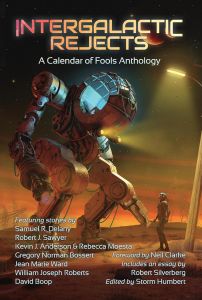
Intergalactic Rejects (Calendar of Fools)
Edited by Storm Humbert
This anthology is a treasure trove of the unusual, written for writers and by writers. It starts out with a marvelous introduction by Neil Clarke; don’t skip it! It’s well worth reading. And so is the Editor’s Note. If you’re a writer, don’t skip the editor’s stories about how and why these tales ended up where they are. There is also a “Rejection History” after each tale, snyopsizing the writers’ experiences.
It starts out with a story by a frequent contributor to Abyss & Apex: “Pod People” by Rich Larson. The main character is a man who uses a real dolphin body grown to hold a human-connected tech brain that allows him to function as a member of a dolphin pod. All I can say is that Rich Larson never disappoints.
A technological meeting of the minds is the basis of “Collaborators” by Kevin J. Anderson & Rebecca Moesta. There’s a reason this was unlicensed tech! This is perhaps the longest story in the anthology, but it held my interest throughout. I’d have bought it for A&A in a heartbeat.
Christopher Blake’s “Life After Life After Life” shares a day in the life of a female matriarch who is part of a robotic ecosystem adapted to the sea of our system’s meteor belt. Her loves and protective instincts ring true, and their enemies in this ecosystem are equally fascinating. It’s a masterful journey into the mind of an “other” and he makes it look effortless.
Not since Marty McFly straightened out the timeline in Back to the Future II or reading Paul Melko’s The Walls of the Universe have I enjoyed a timeline-retrieval story as much as I loved “Lost in the Mail” by Robert J. Sawyer. Clever!
“Almost Time” by Andrew Jackson was inspired by a prompt: “The Last Voyage.” Stories of colony ships gone wrong are legion, but this is a poetic entry into the subgenre.
I loved “For the Rectitude of Our Intentions” by Stephen Kotowych. It concerns a document written in blood and the price of not sacrificing one’s ideals.
The frighteningly short “Disclaimer: This Is Not Your Child” by Sam Loiaconi stuck with me long after I fished reading it. The power of this story is all in the negative spaces, in the things not said.
“Messenger of Death” by William Joseph Roberts sort of takes the premise of The Santa Clause, only it’s not about St. Nick; it’s about the grim reaper’s assistant and set in Ireland. Loads of fun.
I love a good ghost story, and “Tears in the Nursery” by Catherine Wells certainly is that, with a twist.
How very odd that she was unable to sell this one. “Walk Slowly and Bring a Magnifying Glass” by Marie Croke explores a young person out into the wide world as her old reality from her upbringing becomes more confining. All of the tale is done by analogies.
The next one is a sort of anti-St.-Patrick tale that involves druids and the true value of the snakes he removed from Ireland. I liked “Brigid and the Snakes” by Jean Marie Ward.
“Upsized Savior” by David Boop turns out to be a “deal with the devil” sort of tale, but those who deserve their comeuppance surely get it.
“Birdsong” by Erica Ruppert sort of reaches for what “The Screwfly Solution” by James Tiptree Jr. accomplished, but using poisons.
Set in WWI, the desire of the military brass to pave over UFOs is the theme of “Encounter over Flanders” by Laurence Raphael Brothers.
The title, “On the Last Day You Die,” gives much of this story away, but Sam W. Pisciotta does something strange and new with a body-snatcher theme. I should note that it’s not exactly horror, but that many of the anthology’s authors have extensive horror credentials.
Socks may go missing in the wash, but“Forget-Me-Not” by Greg Bossert has dryer lint goes missing with riveting results.
Ooh, next the concept of bringing celebrities back–not as AI creations but in the flesh– intersects with the continuing timeline of Kurt Kobain, and may explain his suicide. “Boddah” by Paul Dale Smith is chilling.
In “The Sea Monster,” by Amelia Dee Mueller, an office worker suspects that she is being gaslit about coworkers turning into sea monsters, which is really a metaphor for sexual predators in the workplace.
All I can say is that I agree with some of the rejections Samuel R. Delany got for “The Wyrm.” Not my cup of tea.
As stated earlier, I love good ghost stories, and this one is one of the best I’d ever read. “The Horses of Pazyryk” is set in 1990s Russia, and the protagonist avoids stresses at home and increasingly-violent bullies by hanging out in a museum where the ghosts of war horses try to communicate with him. Well done, Sam Harris!
The anthology ends with a lovely essay by Robert Silverberg. As stated at the beginning of this review this book is written by writers, for writers; for that theme this is the capstone of the arch. Again, “It Wasn’t All That Easy” is well worth reading and an appropriate denouement to a book of stories that pretty much never saw the light of day…until now.
Here’s a link to it on Amazon. The book debuts June 20, 2025.
